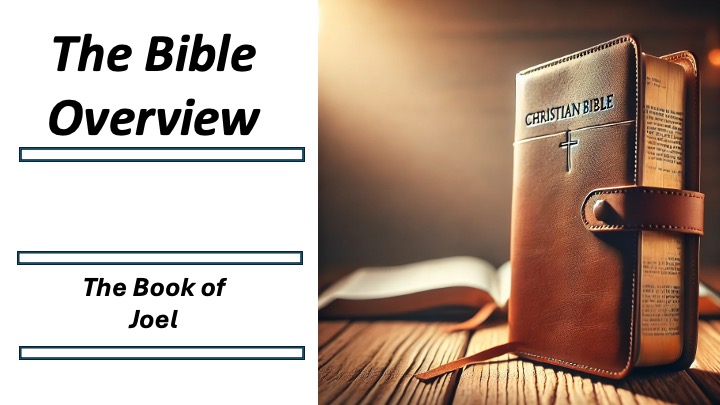Bible Overview Joel
Mike Ervin

The Book of Joel: Overview
Authorship
Traditional View:
• The book is attributed to Joel, son of Pethuel (Joel 1:1).
• Very little is known about Joel; his name means “Yahweh is God.”
• He was likely a prophet in Judah (southern kingdom).
Modern Scholarly View:
• Some scholars believe Joel was a historical prophet, while others suggest the
book may be a post-exilic composition drawing on earlier prophetic traditions.
• The lack of specific historical references makes determining Joel’s identity
and period difficult.
Date of Authorship
• Traditional View:
• Some place Joel in the 9th century BC, during the reign of Joash (835–796
BC).
• This view is based on the absence of Assyrian or Babylonian threats and the
emphasis on priests and the temple.
• Modern View:
• Most scholars date the book to the 6th–4th century BC, possibly after the
Babylonian exile (586 BC).
• The mention of a scattered Israel (Joel 3:2, 6) and the focus on Jerusalem
and the temple suggest a later period.
• The lack of a specific king and references to earlier prophetic books suggest
a literary rather than historical setting.
Intended Audience
• Primarily written for Judah (southern kingdom).
• It calls the priests, elders, and people to repentance.
• The book warns of God’s judgment but also offers hope for restoration.
Major Themes
1. The Day of the Lord – A coming judgment and salvation (Joel 1:15, 2:1-2,
2:28-32).
2. Repentance and Restoration – A call for fasting, prayer, and turning to God
(Joel 2:12-14).
3. Locust Plague as Judgment – A symbol of divine punishment, possibly literal
or metaphorical (Joel 1:4).
4. Outpouring of the Holy Spirit – A prophecy fulfilled in the New Testament at
Pentecost (Joel 2:28-29, Acts 2:16-21).
5. God’s Judgment on the Nations – God will punish oppressors and restore His
people (Joel 3:1-16).
Chapter-by-Chapter Summary
I. The Locust Plague and a Call to Repentance (Ch. 1–2:17)
• Ch. 1 – A devastating locust plague serves as a metaphor for coming judgment.
• Ch. 2:1-11 – The Day of the Lord is imminent, bringing destruction like an
invading army.
• Ch. 2:12-17 – A call to repentance, urging fasting and prayer.
II. God’s Promise of Restoration (Ch. 2:18-32)
• Ch. 2:18-27 – God responds with a promise to restore crops, land, and people.
• Ch. 2:28-32 – The outpouring of the Spirit, fulfilled at Pentecost (Acts
2:16-21).
III. Judgment on the Nations and Final Restoration (Ch. 3)
• Ch. 3:1-16 – Judgment on the nations for oppressing Israel.
• Ch. 3:17-21 – Jerusalem’s restoration and God’s eternal reign.